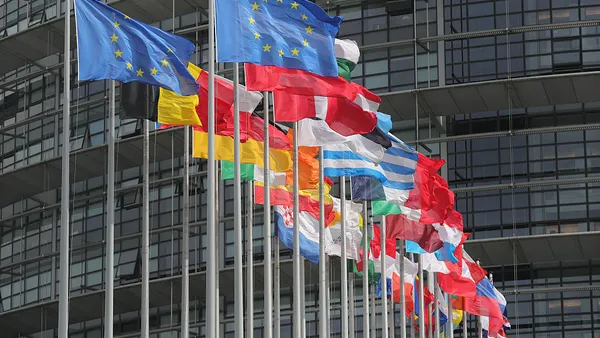Dive Brief:
- The renewable energy industry has steadily improved its core human rights policies and practices, despite facing political and financial challenges, according to the Business & Human Rights Resource Centre’s latest Renewable Energy and Human Rights Benchmark report.
- BHRRC — an international NGO promoting corporate accountability and transparency by highlighting companies’ social and environmental impact on communities — found that since 2023, more than two-thirds of companies, including solar panel and wind turbine manufacturers and project developers, have improved their scores across a range of social issues. The scores are based on the United Nations’ Guiding Principles on Business and Human Rights.
- However, renewable energy companies have still not addressed “critical gaps,” such as responsible mineral sourcing, publicly disclosing complete solar supply chains, Indigenous Peoples’ rights and benefit-sharing agreements for affected communities, the Sept. 17 report found.
Dive Insight:
As the world transitions away from fossil fuels and renewable energy companies rush to build projects and earn profits, a wide range of stakeholders worry that the industry is ignoring or violating the fundamental human rights of Indigenous peoples, artisanal and small-scale miners and other vulnerable populations.
Indigenous peoples, in particular, are “confronted with an energy transition that, so far, repeats the mistakes of the past, through massive exploitation of our resources, entrenching of inequalities and trampling over our rights,” Joan Carling, executive director of nonprofit Indigenous Peoples Rights International, said in the report.
Most renewable energy companies also lack policies aligned with international law on the rights of Indigenous Peoples, according to BHRRC’s findings.
“Ignoring these rights is irresponsible and short-sighted. Instead of advancing sustainable development, it fuels conflict and distrust,” Carling said.
BHRRC said that while those sacrifices may seem necessary to tackle the climate crisis, they actually undermine the goals of renewable energy companies.
“A fast transition can only be achieved if public trust is not squandered through abusive approaches,” the report says.
In fact, adopting and implementing human rights practices is a competitive advantage for renewable energy companies because it can speed up project timelines and reduce legal risk, “precisely because it is also fair,” the report says.
“In some cases, Indigenous Peoples have resorted to litigating unjust projects because our legitimate concerns are being ignored — as exemplified by the cases of the Lake Turkana project in Kenya or Fosen Vind in Norway,” Carling said.
As a result, a growing number of renewable energy companies are embedding human rights due diligence into their operations and supply chains, providing remedies and/or making it easier for workers and affected communities to file grievances.
However, adoption has been uneven throughout the renewable energy sector. Solar panel manufacturers have advanced more than wind turbine producers. And utility project developers in Europe, including Ørsted, Iberdrola and Enel Green Power, have made significantly more progress than those based in other markets, such as Duke Energy and Southern Co. in the U.S.
The report argues that greater respect for human rights and shared prosperity would accelerate the deployment of renewable energy while minimizing the burdens on the people and places that are essential to it.
Indigenous peoples “are not and never were a barrier to responsible wind and solar projects’ deployment,” Carling said. “On the contrary, Indigenous Peoples are pioneers in the fight against climate change, and are the allies of progressive actors respecting our rights and dignity. It starts with a commitment — not mere lip service to respect rights, especially when legal protections are weak.”
Earlier this year, a separate report from BHRRC found that renewable energy projects were facing increased litigation, pointing to the 95 legal cases that have been filed globally since 2009, claiming human rights harms caused by the renewable energy sector. The July report said about 77% of these cases have been filed since 2018, aligning with the recent surge of project developments in the energy transition sector.












